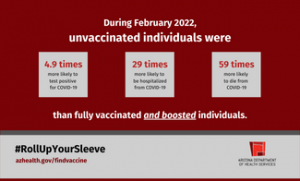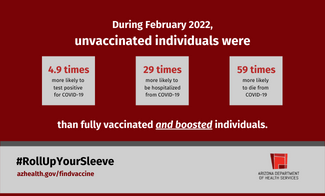 Following yesterday’s authorization of a second COVID-19 booster dose for ages 50 and older and those with weakened immune systems, new data shows just how much of a difference a booster dose makes.
Following yesterday’s authorization of a second COVID-19 booster dose for ages 50 and older and those with weakened immune systems, new data shows just how much of a difference a booster dose makes.
During February, compared to individuals who were fully vaccinated with a booster, unvaccinated people ages 18 and older had:
- 4.9 times the risk of testing positive for COVID-19;
- 29 times the risk of being being hospitalized from COVID-19; and
- 59 times the risk of dying from COVID-19.
Our twice-monthly report on COVID-19 outcomes by vaccination status also found that compared to fully vaccinated individuals without a booster an unvaccinated individual had:
- 3.9 times the risk of testing positive for COVID-19;
- 11 times the risk of hospitalization from COVID-19; and
- 14 times the risk of dying from COVID-19.
Boosters are recommended for everyone ages 12 and older at least five months after your primary vaccination series with Moderna or Pfizer or at least two months after the Johnson & Johnson/Janssen shot. Those authorized for a second booster dose should get one at least four months after their first booster.
Research shows that COVID-19 vaccine protection wanes over time and that boosters do a great job of increasing your immune response to protect against COVID-19. You’ll find hundreds of convenient providers at azhealth.gov/FindVaccine.
Meanwhile, our updated COVID-19 sequencing report shows that the BA.2 Omicron subvariant grew to 9% of sequenced cases in Arizona during February. While the proportion of BA.2 cases is increasing, COVID-19 cases statewide remain on a downward trend at this time.
Viruses are constantly changing through mutation, and the one causing COVID-19 is no exception. The best protection is getting vaccinated and, when the time comes, making sure your protection is up to date by getting a booster dose.










